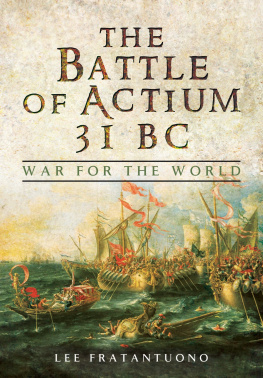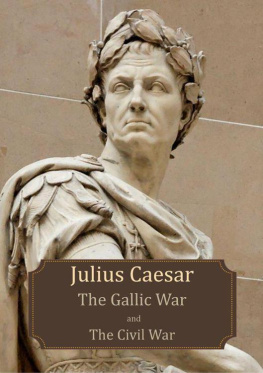50minutes - The Battle of Actium: The End of the Roman Civil Wars
Here you can read online 50minutes - The Battle of Actium: The End of the Roman Civil Wars full text of the book (entire story) in english for free. Download pdf and epub, get meaning, cover and reviews about this ebook. year: 2016, publisher: 50Minutes.com, genre: History. Description of the work, (preface) as well as reviews are available. Best literature library LitArk.com created for fans of good reading and offers a wide selection of genres:
Romance novel
Science fiction
Adventure
Detective
Science
History
Home and family
Prose
Art
Politics
Computer
Non-fiction
Religion
Business
Children
Humor
Choose a favorite category and find really read worthwhile books. Enjoy immersion in the world of imagination, feel the emotions of the characters or learn something new for yourself, make an fascinating discovery.

The Battle of Actium: The End of the Roman Civil Wars: summary, description and annotation
We offer to read an annotation, description, summary or preface (depends on what the author of the book "The Battle of Actium: The End of the Roman Civil Wars" wrote himself). If you haven't found the necessary information about the book — write in the comments, we will try to find it.
50minutes: author's other books
Who wrote The Battle of Actium: The End of the Roman Civil Wars? Find out the surname, the name of the author of the book and a list of all author's works by series.
The Battle of Actium: The End of the Roman Civil Wars — read online for free the complete book (whole text) full work
Below is the text of the book, divided by pages. System saving the place of the last page read, allows you to conveniently read the book "The Battle of Actium: The End of the Roman Civil Wars" online for free, without having to search again every time where you left off. Put a bookmark, and you can go to the page where you finished reading at any time.
Font size:
Interval:
Bookmark:



- When: 2nd September, 31 B.C.
- Where: Near Actium, Greece
- Context: The civil war between Octavius and Mark Antony
- Belligerents: Octavius and his supporters against Mark Anthony, Egypt and their supporters
- Commanders and leaders:
- Octavius, Roman politician (63 B.C.-14 A.D.)
- Marcus Vipsanius Agrippa, Roman general and politician (63-12 B.C.)
- Mark Antony, Roman politician (83-30 B.C.)
- Cleopatra, Queen of Egypt (c. 69-30 B.C.)
- Outcome: Victory for Octavius
- Victims:
- Octavius camp: it is impossible to estimate losses
- Mark Antony and Cleopatras camp: approximately 5,000 deaths

- Africa was given to Lepidus;
- The Western provinces (Italy, Gaul and Spain) were given to Octavius;
- The richer provinces (Greece, Egypt and Minor Asia) were awarded to Mark Antony.
Font size:
Interval:
Bookmark:
Similar books «The Battle of Actium: The End of the Roman Civil Wars»
Look at similar books to The Battle of Actium: The End of the Roman Civil Wars. We have selected literature similar in name and meaning in the hope of providing readers with more options to find new, interesting, not yet read works.
Discussion, reviews of the book The Battle of Actium: The End of the Roman Civil Wars and just readers' own opinions. Leave your comments, write what you think about the work, its meaning or the main characters. Specify what exactly you liked and what you didn't like, and why you think so.












